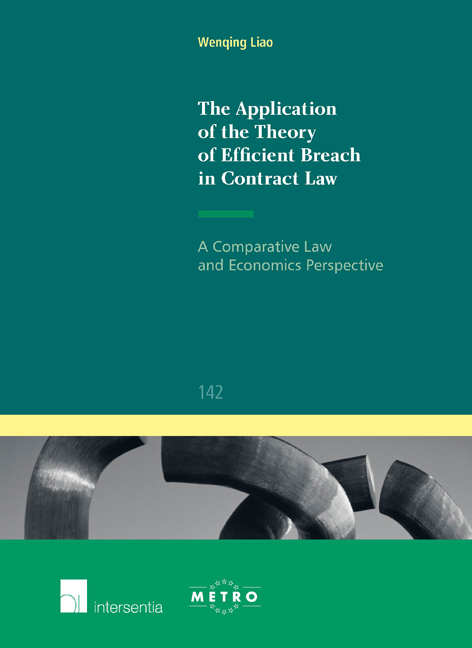 The Application of the Theory of Efficient Breach in Contract Law
The Application of the Theory of Efficient Breach in Contract Law Published online by Cambridge University Press: 12 December 2017
According to law and economics theory, contract law should facilitate transactions and hence promote welfare maximization. In the absence of complete contracts, it is necessary for the system of remedy rules to shape the parties’ incentives to make efficient contracts ex-ante and to act optimally after the contract has been concluded. Accordingly, contract remedy techniques, such as techniques to encourage accurate evaluation, to promote efficient precaution, to avoid performance when it is inefficient to do so and to optimally allocate future risks are desirable. Moreover, contract law may also include particular rules dealing with risks that fall out of the scope of a contract. This chapter will apply the theory of efficient breach to English sales law by analysing its remedy rules and rules in relation to unexpected risks. After a basic introduction to English sales law in section 1, section 2 of this chapter will provide the framework of a buyer's remedies, including the remedy of specific performance, monetary damages and remedies stipulated by contract parties. Afterward, section 3 will analyse the English doctrines of frustration and hardship, which deal with contracts falling into the efficient breach zone. An economic analysis of English law will be made in section 4 in order to examine to what extent a seller is motivated to adhere to the contract as well as to analyse the role of party-autonomy in dealing with breach and performance of commercial sales contracts. Section 5 will conclude.
Introduction to English Sales Law
What we call English sales law mostly refers to the modern law of sales which dates from the end of the 19th century. Before the Sales of Goods Act 1893 (hereinafter SGA 1983), the law of sales basically consisted of common law and a few enactments applying to the general aspect of contracts. Originally, it was the criminal statutes, for instance, rules prohibiting “the use of false measures.or the adulteration of food” that regulated sales transactions and actions on sales were majorly based on deceit, relating to fraud or breaches of express warranty.
To save this book to your Kindle, first ensure [email protected] is added to your Approved Personal Document E-mail List under your Personal Document Settings on the Manage Your Content and Devices page of your Amazon account. Then enter the ‘name’ part of your Kindle email address below. Find out more about saving to your Kindle.
Note you can select to save to either the @free.kindle.com or @kindle.com variations. ‘@free.kindle.com’ emails are free but can only be saved to your device when it is connected to wi-fi. ‘@kindle.com’ emails can be delivered even when you are not connected to wi-fi, but note that service fees apply.
Find out more about the Kindle Personal Document Service.
To save content items to your account, please confirm that you agree to abide by our usage policies. If this is the first time you use this feature, you will be asked to authorise Cambridge Core to connect with your account. Find out more about saving content to Dropbox.
To save content items to your account, please confirm that you agree to abide by our usage policies. If this is the first time you use this feature, you will be asked to authorise Cambridge Core to connect with your account. Find out more about saving content to Google Drive.